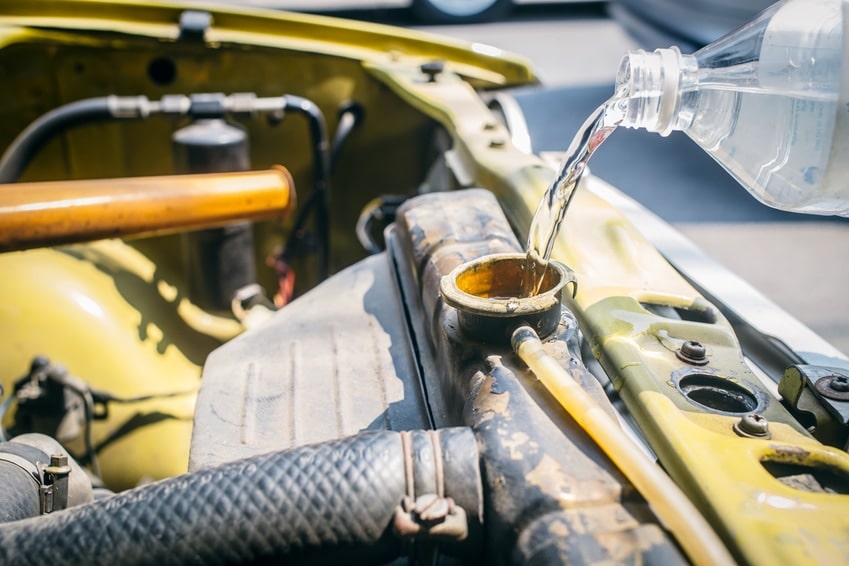Car care firms (like us) are always going on and on about the importance of topping your car up with high-performance coolant/antifreeze that offers your engine the very best protection. But just how important is a good quality coolant/antifreeze to your car, and what exactly does this fluid do beneath the bonnet?
Aside from fuel, oil and screen wash, most drivers don’t pay much attention to the fluids that help our cars get us from A to B without having a bad breakdown — and this is particularly true of coolant/antifreeze.
Unless your car’s cooling system springs a leak or your mechanic suggests changing the coolant as part of its annual service, a lot of us probably go months without giving coolant/antifreeze a second thought. But what impact could this have on the level of protection within the cooling system, and how do you go about testing the strength of your car’s coolant/antifreeze without paying a garage to do it for you?
This guide is here to answer all the questions you might have about engine coolant — including what it does, how you can test it and why you should invest in a high-performance version of this essential engine fluid.
- What Should I Look for in a Coolant/Antifreeze?
- How Can I Check the Performance of My Car’s Coolant/Antifreeze?
What Should I Look for in a Coolant/Antifreeze?
Temperature Protection:
The whole purpose of coolant/antifreeze is to regulate the temperature of your car’s engine, so it makes sense to look for one which gives you the best protection against both overheating and freezing.
At Prestone, we’d always recommend investing in high-performance coolant/antifreeze that is guaranteed to protect the engine from extreme temperatures between -37°C and 129°C. This will safeguard against extreme temperatures here in the UK, and also abroad if you take your car on holiday, so you can be sure that you’re getting the best protection whatever the weather.
Lifetime of the Product:
Coolant/antifreeze does not last forever. Even though your car doesn’t “use it up” (like fuel for example) you can’t just put it in once and forget about it, as it will eventually stop giving you protection.
This is why it makes sense to check how long it will last, and select one which will give you protection for the longest time possible. For example, some coolants will keep working for around 3 to 5 years, but with Prestone you get 10 years of protection, or 300,000 miles (whichever comes first). This means you get more value for money and add it to your car without having to worry about it for a long time.
Anti-Corrosion Protection:
Coolant/Antifreeze is Ethylene glycol which provides the temperature protection, and this makes up the majority of products you buy. A small percentage of each product though will be different, and these differences can be very important. Prestone uses a secret combination of 95% Ethylene glycol, 1-3 % water and 1-4% inorganic /organic corrosion-inhibitions.
We have 44 scientists working in a state of the art laboratory in America, ensuring that our coolant/antifreeze offers you the best corrosion protection possible. We use organic acid technology (OAT) to create a patented corrosion-inhibiting formula which helps to prevent leaks. Modern cars use aluminium and magnesium parts, so we’d recommend choosing a product which uses a modern formula tested on these metals.
How Can I Check the Performance of My Car’s Coolant/Antifreeze?
Overtime, coolant/antifreeze can become clogged with particles, which could prevent it from offering the same protection to your car’s cooling system. If you rarely flush your radiator and top it up with new coolant/antifreeze, you may find the fluid in the reservoir starts to discolour over a long period of time. This could mean the cooling system isn’t properly protected, or it could be a sign of a larger problem that needs sorting.
In the past, the only way to check the condition of your car’s coolant was to take it to a mechanic — which could prove costly for the small amount of work needed. Now though, you can check the performance of your car’s coolant/antifreeze right in your driveway with the Prestone Coolant/Antifreeze Tester.
The coolant/antifreeze tester tests for the winter protection of your car’s coolant down to -37°C, and the summer protection up to 129°C — ensuring the cooling system is always protected. The device works with any type of coolant and is guaranteed for use with all vehicles, so you can start using it straight away regardless of the type of coolant/antifreeze in the reservoir.
The great thing about the Prestone Coolant/Antifreeze Tester is that it’s extremely easy to use, helping you check the performance of your coolant in a matter of minutes. All you have to do is open up the coolant reservoir under the bonnet (only when the car is switched off and the engine is cool), and take out a sample of the fluid using the pipette on the tester. You should draw up enough coolant/antifreeze so it reaches the fill line, and the pointer inside the tester is completely submerged.
Once the tester is filled with coolant/antifreeze, remove it from the reservoir and check the sample for discolouration and contaminants like rust, engine oil and transmission fluid. Then, read the temperature protection using the gauge on the side of the tester — you’re looking for a freezing point of -37°C and a boil over protection of 129°C.
If the coolant/antifreeze is discoloured and dirty, or if the temperature protection isn’t up to scratch, you should flush the cooling system and refill the reservoir with new, high-performance coolant/antifreeze. If the coolant/antifreeze passes the test, you’re good to keep on driving — just remember to pop the cap back on the coolant reservoir when you’re done.
For high-performance coolant/antifreeze that will never let you down, you can count on Prestone. Our ready-to-use and from concentrate coolant/antifreeze is tested in extreme conditions to guarantee all-round protection for your car. To find out more about our high-quality products, visit the Prestone homepage.


